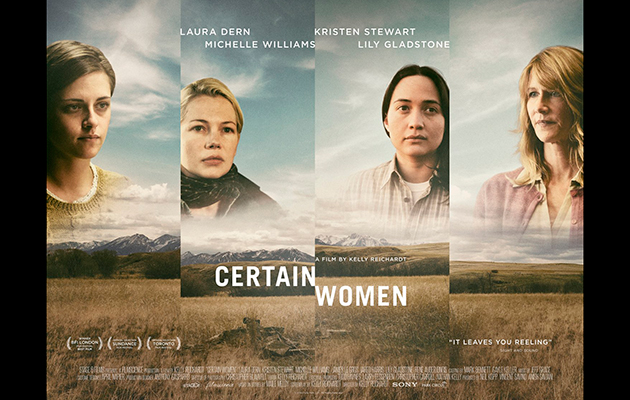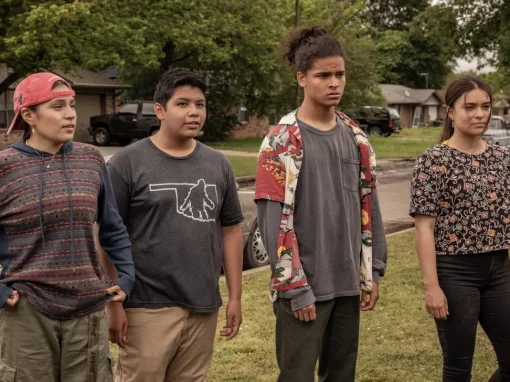Here’s a run-down of the notable films I caught in Toronto. I’ll be writing about some of these in the weeks to come.
Best-of-the-Fest:
Toni Erdmann (Maren Ade, Germany)
Certain Women (Kelly Reichardt, USA)
A Quiet Passion (Terence Davies, UK)
Elle (Paul Verhoeven, France)
Superb:
Aquarius (Kleber Mendonça Filho, Brazil)
Nocturama (Bertrand Bonello, France)
The Death of Louis XIV (Albert Serra, Spain)
Paterson (Jim Jarmusch, USA)
The Dreamed Path (Angela Schanelec, Germany)
The Ornithologist (João Pedro Rodrigues, Portugal)
The Unknown Girl (Luc & Jean-Pierre Dardenne, Belgium)
I Am Not Your Negro (Raoul Peck, USA)
Strong:
Yourself and Yours (Hong Sang-soo, South Korea)
Fire at Sea (Gianfranco Rosi, Italy)
The Rehearsal (Alison Maclean, New Zealand)
Kékszakállú (Gaston Solnicki, Argentina)
Austerlitz (Sergei Loznitsa, Ukraine)
Discovery Of The Fest:
The Human Surge (Eduardo Williams, Argentina)
A Small Glimpse Made Me Super-Eager To See More:
Six short films by Ana Mendieta
Others Appreciated These Films More Than I Did:
Moonlight (Barry Jenkins, USA)
The Dreamed Ones (Ruth Beckermann, Germany)
Mimosas (Oliver Laxe, Morocco)
General Report II: The New Abduction of Europe (Pere Portabella, Portugal)
How to Electrify an Audience of Hundreds:
I Am Not Your Negro (Raoul Peck, USA)
Cinema = Bodies Moving Through Space:
Nocturama (Bertrand Bonello, France)
The Human Surge (Eduardo Williams, Argentina)
A Festival Of Great Performances By Women:
Isabelle Huppert (Elle); Sandra Hüller (Toni Erdmann); Sonia Braga (Aquarius); Cynthia Nixon (A Quiet Passion); and the cast of Certain Women.
Best Q&A:
Maren Ade (Toni Erdmann); and João Pedro Rodrigues (The Ornithologist)
Film That Generated The Best Conversations:
Elle (Paul Verhoeven)
Film With The Best Soundtrack Music:
Aquarius (Kleber Mendonça Filho)
pic: Nocturama (Bertrand Bonello, France)



Nathan
September 21, 2016 at 3:31 pm
It's really intersting to me to see how differently the Bonello is playing out on each side of the Atlantic. Most of the younger critics I feel close to in France, as well as myself, have very little good things to say about it (most of them linked to the opening twenty minutes, until the characters start speaking. It's all downhill from there…); while most of the american critics I follow seem to love it. It might be due to contexts: not so much terrorist attacks in France as a strong left-wing social movement last spring, which makes the "radical chic" character of the film and the idiocy of the character's few hinted positions so grating. But I have yet to read a piece taking its defense that I find convincing.
girish
September 21, 2016 at 3:37 pm
Fascinating, Nathan! I love the first hour — and warmed to the second only days after seeing the film (I felt somehow impelled to give section 2 the benefit of the doubt). I'll be super curious to see the film again; I have no idea how my response will change but I'm pretty sure it will….
Nathan
September 21, 2016 at 4:55 pm
Yes, I thoroughly enjoyed the silent ballet through the metro. A friend called it pointless, which is maybe precisely why I was fine with it. But I can only agree with the first reaction you expressed in your tweet, concerning the overt legibility of the second half ("They're products of the society they want to blow up!" "Dude, deep"). As a friend pointed out, there's also a fundamental hypocrisy in the way he handles his characters: ruthlessly efficient pros in the first half; bumbling fools in the second; and in the final minutes we're still supposed to be shocked about the slaughter in a "after all they're just kids" way, allowing Bonello to keep his political street cred.
Also, in what world does it make sense to bring everyone together in the Samaritaine to avoid attracting attention after having been scattered undetected over four different locations?
girish
September 21, 2016 at 9:23 pm
Well, Nathan, you're being pretty persuasive here — and it makes me look forward to seeing the film again to test my response!
Unknown
September 24, 2016 at 2:46 pm
Interesting. I have to say, I didn't care for Elle or Toni Erdmann at all, but to each their own I guess. In the case of Elle, it may require a second viewing at some point on my part, even though I actively disliked it the first time. It essentially felt like a Haneke film in reverse to me, where the film opens with the "shock moment" rather than concluding with it and then seeks to make sense of what we've witnessed only to lecture us on the fact that things weren't quite what they seemed.
Also Girish, on a note not directly related to this, I wanted to ask you your thoughts on something I found you wrote in the comments section of one your older posts. Rather than try to paraphrase I'll just paste what you wrote here:
"Our personal tastes and preferences (while surely being culturally formed, no doubt about it!) are not isolated and free of politics. They contain within them imaginings of a better, more just world–or alternatively: imaginative, original, or complex representations of our highly imperfect world. Thus, to me: keeping our tastes and preferences APART from our criticism/teaching/curating is a sort of betrayal of one's deepest political values and beliefs . In fact, this, to me, is more narcissistic than polemicizing for our preferences.
In other words, when we advocate for certain films or directors, it is not merely the films we want to advance but also certain ways of looking at the world (a highly political act), critiquing our world, imagining a better world. This, to me, is the opposite of narcissism."
So I was just curious, because I've noticed there are certain films I consider amongst the 10-20 greatest films ever made that in six years I've never watched more than twice all the way through, such as PlayTime and The Searchers, whereas I've probably seen Contempt in its entirety at least 15-20 times and L'Avventura at least half a dozen times. So perhaps I could just conclude from this that rewatchability maybe hinges on other factors not exclusively tied to relative greatness, and that I shouldn't presume I'm just dilettante-ishly paying lip service to PlayTime's greatness without necessarily 'loving' it, because I feel I do genuinely love it. It's just not the kind of film that lends itself to casually being popped into your disc player at 9:30 or 10 on a Wednesday night whereas something Contempt is. What are your thoughts?
Unknown
September 24, 2016 at 3:04 pm
I'm completely in favor of cinephiles cultivating their own personal sensibility. Maybe I would just argue that one needs to at least familiarize themselves with the discourse before they can question it. I have very little tolerance for people who gloat about only having seen two films in the S&S top 50 and then pontificate about how they don't "follow authority" and "know what they like". I think you know what I mean there.
girish
October 10, 2016 at 7:06 pm
Remy, I agree with your points above: first, that the number of times we return to a film is not necessarily correlated to how "great" we might think it is (many great films take a lot out of us, demand a lot of us, physically, emotionally, psychically); and second, that one must familiarize oneself with a discourse before questioning or dismissing it.
Unknown
October 18, 2016 at 9:22 pm
Thanks for responding Girish. I just have one minor quibble. Surely, we can realize on some level that certain works are great and significant even if they aren't necessarily 'personal favorites'. So where do we draw the line? Wouldn't it be taking things a bit far if a literature academic were to overlook Shakespeare in his research simply because he's not a 'personal favorite'. In my opinion, either extreme can be narcissistic, since we need to realize our own tastes are not infallible and are clearly often the product of certain aesthetic biases. So yes, I'm sorry but to some extent I think one can separate 'personal favorites' from films they consider to be 'objectively' the greatest. Le Cercle Rouge is a 'personal favorite' of mine as is Pierrot Le Fou, but I'd hesitate to argue either one of them is among the ten greatest films ever made, top 100 sure. So sometimes I think you do need to "do your homework" and engage with work that you don't instinctively 'love'. So on some level, I do think there needs to be a balance between 'cultural gatekeeping' and 'liking what you like'. Either extreme can be problematic. How do we avoid the pitfall of "well oh, I just love Amelie and The Shawshank Redemption more than Rules of the Game and that's that"?
girish
October 18, 2016 at 9:51 pm
Not sure I believe in "objectively great" films, Remy. Sure, there are films that a large number of critics over time have chosen as strong films–but strong or great based on what criteria, exactly? Simply invoking aesthetics here is not enough because, for instance, there are is not a single aesthetic paradigm by which we judge films but instead *multiple* aesthetic paradigms that are out there and in use–e.g. classicism, modernism, postmodernism, and so on–which will complicate any notions of evaluative consensus.
Also, remember that the vast majority of films that have been tagged "great" (eg by polls such as Sight & Sound) have been made by white men–thus making these evaluations already "skewed" and "biased" towards privileging a certain kind of experience in the world (the experience of white, western men). So, white Western men are more likely to claim as great those artworks that are made by other white western men because of their affinity of identity (and, thus, ideology). Another reason why an "objective" evaluation of great films is highly problematic.
One might alternatively say that the "best" films are those that use the capabilities and powers of the cinematic medium in the best, most imaginative way. This kind of way of looking at cinema is common to most cinephiles. But it is mostly an *aesthetic* argument–and films are about more than just aesthetics, they are also about politics….
Unknown
November 22, 2016 at 11:25 am
Oh, I absolutely agree on there being multiple aesthetic paradigms. And yes, I won't argue about the thorniness of "objectivity". But also, there are some who argue a work's politics can't be separated from its aesthetic attributes or lack thereof. I haven't decided yet how I feel about that, but it's not entirely unjustified. So kitchen sink social realism may purport to be sympathizing with the plight of the downtrodden, thus displaying progressive or radical aims, but it's rather conventional bourgeois aesthetic would suggest otherwise. But all the same, I don't think the political left has a monopoly on the creation of great art, even if in the post-WWII it's certainly seemed that way. As for the "white man" issue, I'd say the tide is slowly turning. There are plenty of Japanese filmmakers in the "Pantheon" after all as well as Ray and Kiarostami, and of course Criterion just announced Black Girl. Those are just a few examples, although I think it's a bit extreme to suggest that the canonization of Bresson or Renoir or who-have-you is just some white supremacist conspiracy. Just my two cents. The increasing pluralism of modern-day cinephilia isn't doing anything to necessarily qualify the status of the likes of Bresson.